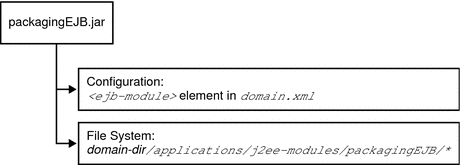Module Runtime Environment
The following figure illustrates the environment for individually deployed module-based deployment.
Figure 3–3 Module runtime environment

For file system entries, modules are extracted as follows:
domain-dir/applications/j2ee-modules/module-name domain-dir/generated/ejb/j2ee-modules/module-name domain-dir/generated/jsp/j2ee-modules/module-name
The applications directory contains the directory structures described in Directory Structure. The generated/ejb directory contains the stubs and ties that an ACC client needs to access the module; the generated/jsp directory contains compiled JSP files.
Lifecycle modules (see Chapter 10, Developing Lifecycle Listeners) are extracted as follows:
domain-dir/applications/lifecycle-modules/module-name
Configuration entries are added in the domain.xml file as follows:
<server>
<applications>
<type-module>
...module configuration...
</type-module>
</applications>
</server>
The type of the module in domain.xml can be lifecycle, ejb, web, or connector. For details about domain.xml, see the Sun Java System Application Server Enterprise Edition 8.2 Administration Reference.
- © 2010, Oracle Corporation and/or its affiliates
